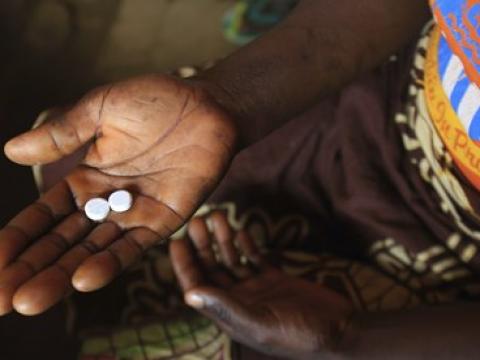Malaria deaths among children under five halved since turn of the century

Originally posted by Liz Ford in theguardian.com, Wednesday 11 December 2013.
World Health Organisation report identifies 51% drop among under-fives between 2000-12, and 45% fall across all ages
The number of children under the age of five dying from malaria has halved since 2000 and is predicted to fall still further over the next two years, according to the World Health Organisation's flagship report on the disease.
Between 2000 and 2012, malaria deaths among under-fives fell by 51%, says the 2013 world malaria report, published on Wednesday. Across all age groups, global deaths fell by an estimated 45%. If the trend continues, deaths will fall by 63% for children under five and by 56% for all ages by 2015, big steps towards meeting global targets to reduce malaria cases and mortality rates.
The report estimates that 3.3m malaria deaths have been averted since 2001, more than two-thirds in the 10 countries with the highest number of malaria cases in 2000. About 3m of those deaths would have been among children under five living in sub-Saharan Africa.
The WHO says greater political commitment and funding to prevent and treat the disease since 2000 has cut incidences of malaria globally by 29% and in Africa by 31%.
In 2012, there were an estimated 207m cases of malaria worldwide and 627,000 malaria deaths, most of which occurred in sub-Saharan Africa.
An estimated 52 countries are on track to meet the 2005 target set by the World Health Assembly to cut incidences of malaria by 75% by 2015, while 59 countries are on course to meet millennium development goal number six to halt and reverse malaria cases between 2000 and 2015. However, the 52 countries account for just 4% of the total estimated cases. Approximately 80% of malaria deaths last year were in just 17 countries. About 40% of malaria deaths and 32% of cases occur in Nigeria and the Democratic Republic of the Congo, the report says.
In the foreword to the report, Margaret Chan, the WHO director general, writes: "The absolute numbers of malaria cases and deaths are not going down as fast as they could. The disease still took an estimated 627,000 lives in 2012, mostly those of children under five years of age in Africa. This means 1,300 young lives lost to malaria every day – a strong reminder that victory over this ancient foe is still a long way off. The fact that so many people are dying from mosquito bites is one of the greatest tragedies of the 21st century."
The WHO says progress in preventing malaria deaths globally has slowed over the past two years as funding levels have fallen.
Despite a huge increase in the amount of money allocated for malaria programmes by international donors and national governments since 2000, when funding levels were less than $100m, less than half of the estimated $5.1bn required to meet the global challenge each year was given in 2012, says the report.
Funding predictions for the next two years are not encouraging. A modest funding increase is expected in 2016, from $2.5bn to $2.85bn. International donors' $12bn commitment to the Global Fund to Fight Aids, Tuberculosis and Malaria at its fourth replenishment round last week was welcome news, although the amount pledged was $3bn less than requested.
The drop in funding was blamed on the slowdown in the distribution of mosquito bednets. In sub-Saharan Africa, less than 50% of the population had access to a bednet this year. In 2012, only 70m new bednets were delivered to malaria-endemic countries, well below the 150m needed every year. The WHO remains optimistic that delivery levels will increase this year and next.
The report includes a note of caution over the emerging resistance to insecticides used for malaria treatment and control. Resistance to artemisinin – a core compound of artemisinin-based combination therapy (ACT), the treatment recommended by the WHO for some strains of malaria – has been found in Cambodia, Burma, Thailand and Vietnam. Mosquito resistance to at least one insecticide used for malaria control has been identified in 64 countries.
"To win the fight against malaria, we must get the means to prevent and treat the disease to every family who needs it," said the UN secretary-general's special envoy for financing malaria, Raymond Chambers. "Our collective efforts are not only ending the needless suffering of millions, but are helping families thrive and adding billions of dollars to economies that nations can use in other ways."
James Whiting, the UK executive director of the NGO Malaria No More, said: "We're edging closer to the day when no child anywhere dies from malaria."